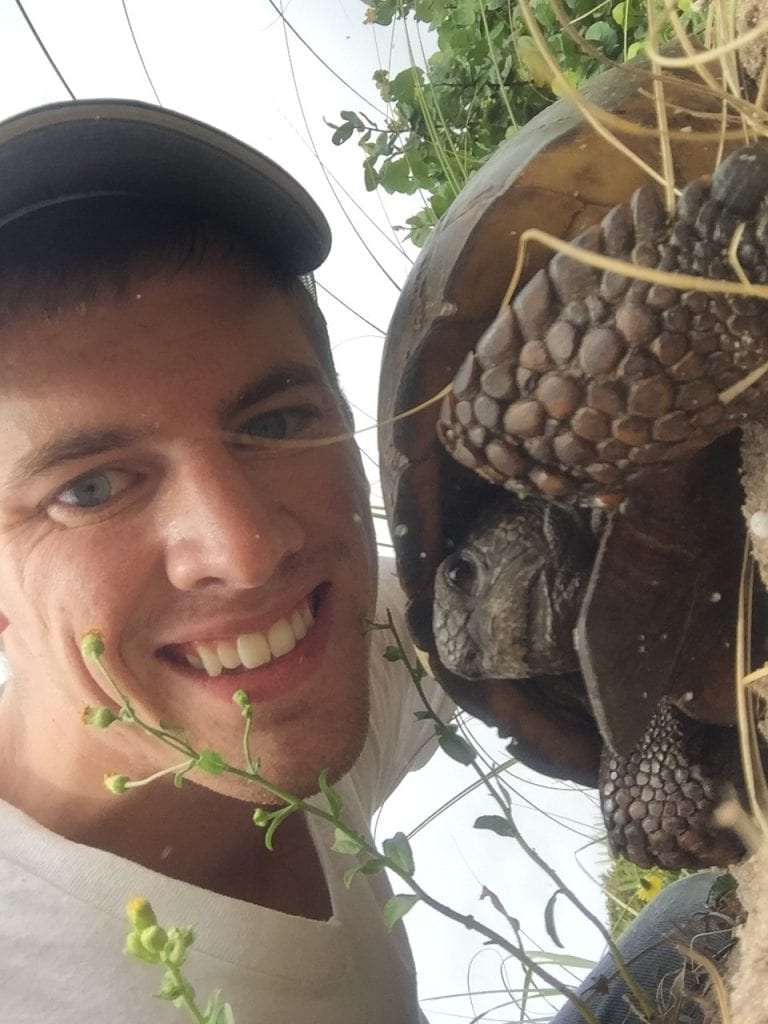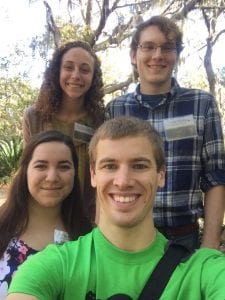Trapped Tortoise Research Earns Award For Alumnus

An abandoned railway presents no obstacle to most people. But it’s a different story altogether if you’re crawling two-inches from the ground with a shell on your back.
Exactly how railways impact the well-being and movement of gopher tortoises was the focus of UCF alumnus Rhett Rautsaw’s research while he pursued a master’s degree in Biological Sciences. Not only did Rautsaw, ’17, advance science’s understanding of these man-made barriers’ role in a natural environment, but it earned him a BioOne Ambassador award earlier this year.
The award is given to scientists who can clearly explain the often-impenetrable jargon of research. A simple, two-minute animated video accompanied his research that succinctly outlined the problem and his proposed solution. He was assisted in creating the video by two other UCF students, Hunter Pylant and Daria (Dasha) Kudryasheva.
“I’ve always been passionate about communicating the importance of science,” said Rautsaw, who grew up taking snakes, lizards and other reptiles to school for presentations. “With this study in particular the results were really clear and actionable.”
 Reaching those results required two full summers of field work around an abandoned railway at Kennedy Space Center: slapping mosquitoes, braving poison ivy and melting in Florida heat. Joining Rautsaw in this labor of love were four undergraduate students: Christopher Yanick, Steffany Medina, Bridget Vincent and Katelyn Lanctot.
Reaching those results required two full summers of field work around an abandoned railway at Kennedy Space Center: slapping mosquitoes, braving poison ivy and melting in Florida heat. Joining Rautsaw in this labor of love were four undergraduate students: Christopher Yanick, Steffany Medina, Bridget Vincent and Katelyn Lanctot.
Gopher tortoises are considered a keystone species, with their abandoned burrows providing homes to upwards of 300 other species. Rautsaw used radio tracking to show that railways impeded tortoise movement, and visually confirmed that tortoises cannot climb their way out of the box created by two rails.
He concluded his research with a trench design that allows tortoises to travel beneath railways, and provides trapped tortoises an escape route. Rautsaw was approached by SunRail about implementing the trench after presenting his research at a local conference. His paper was also awarded Best Student Paper in 2018 by the American Society for Ichthyology and Herpetology’s journal, Copeia.
“It was great to see change begin to happen,” Rautsaw said.
Today, Rautsaw is a doctorate student at Clemson University, where he is studying the macroevolution of venom. A climate-controlled lab is far-removed from the weeds and bugs of field work, but his passion for science and research is unchanged.
“Once you know what you want to do in life, you’ve got to chase it full-on,” Rautsaw said.
